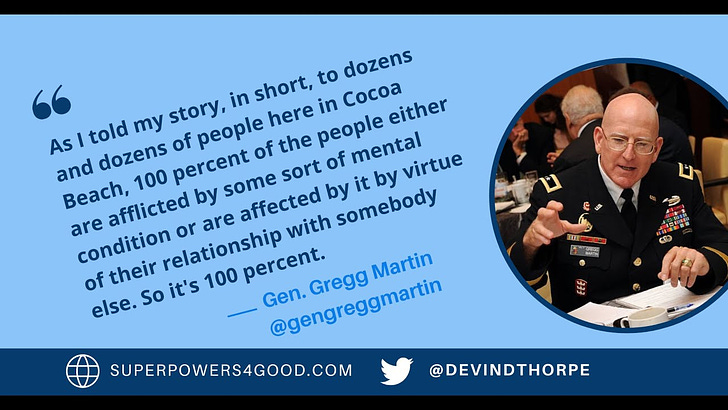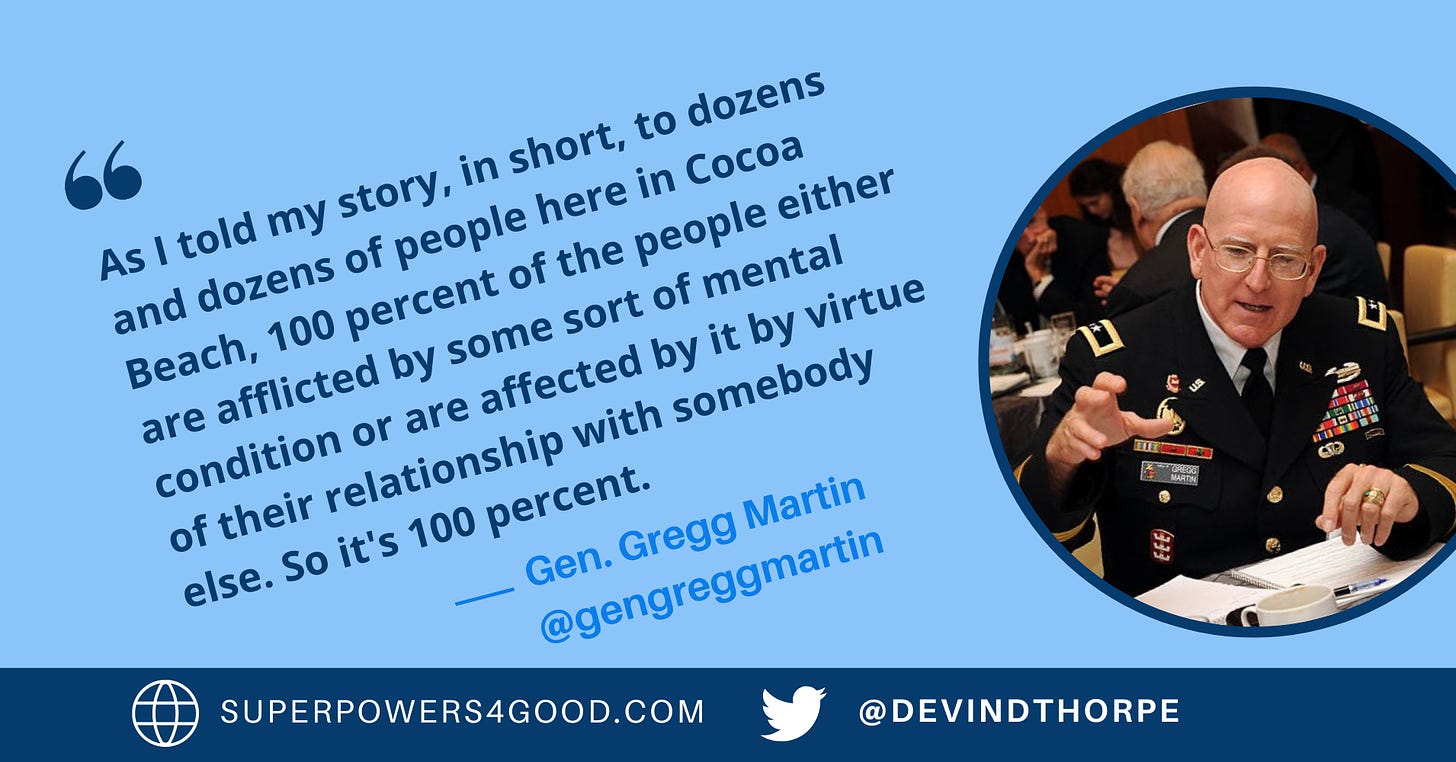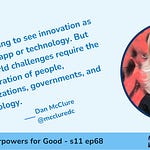If you’re in emotional distress or suicidal crisis, find help in your area with Find a helpline.
Raised by a World War II veteran father, retired two-Star General Gregg Martin anticipated military service. He joined the ROTC at the University of Maine, then transferred to West Point.
“I did really well at West Point, and then I graduated, went out into the active army, the field Army. I just loved it,” Gregg says. “I went to airborne school to be a paratrooper, went to Ranger School. So I was qualified to do the commando Special Forces stuff.”
Gregg loved the challenges service in the Army presented:
The Army was a pretty rough place. There was a lot of drugs. There were racial problems. We had convicted felons who were given the option to come into the military because they couldn't meet the quotas of recruiting. And I just loved it, though. It was real. It was hard. It was dirty. We had an exciting, challenging mission. And I just loved leading the troops.
One opportunity for advancement followed another. “Before you knew it, I was a two-star general and had 36 years active duty in the Army.”
At the pinnacle of his career, Gregg was assigned to lead the prestigious National Defense University. “It's made up of five colleges; it's a graduate school for senior leaders from the military, State Department, intelligence agencies and so forth, to go back to school at the graduate level for a year and get an advanced degree in strategic studies, international security, that sort of thing.”
Gregg shares the story of how bipolar disorder brought an end to his military career and launched a new one as an advocate for mental health.
I have actually been living on the bipolar spectrum since I was a teenager. I lived about 30 years with a mental condition, not an illness, but a condition called hyperthyrmia, which is a near continual state of mild mania.
You get an extra plus up of the chemicals, dopamine, endorphins and others that gave me overabundant energy, enthusiasm, drive, creativity, problem-solving, skills, positivity, all those positive attributes. It's a benefit if you have it. But the downside is that it puts you at a higher risk of developing real mania and real bipolar disorder.
From my teenage years into my forties, unbeknownst to me, I was inching ever closer to mania.
At a certain point, the Veterans Affairs and the Department of the Army Medical Board pegged it at 2003, I was 47 years old, serving in the Iraq war. They believe that that's when my onset of actual bipolar occurred.
From Iraq in '03, over the next 11 years, my bipolar disorder was unknown, undetected, unrecognized, undiagnosed. But I kept going into higher levels of mania, lower levels of depression.
Then I started developing psychosis, which is a combination of delusions in my mind.
I essentially rocketed into full-blown mania. I went into a state of madness, insanity. I was over the top. Off the rails. I was talking faster and faster. I was out of control. I had these grandiose visions that I was on a mission from God. I had all kinds of religious visions with the Holy Spirit and the Apostle Paul and speaking in tongues, I mean, going to 20, 30 religious events per week. I mean, I was really out of control.
I had hallucinations that when I would ride my bike through D.C. at night, I would lift up off the ground and I would be flying on my bicycle over and through the monuments in D.C.
My poor subordinates! I mean, there's no way for any human to keep up with the madness that was going on in my brain. It led to sort of a rebellion on the staff and the faculty at the university.
It's really hard to have that difficult talk with the boss who's a general to say, “Hey, General Martin, we think you have lost it and you have some sort of mental illness.”
But what they did, which was equally as effective, is they started writing anonymous complaints to my boss, who was the chairman of the Joint Chiefs of Staff.
We were very good friends, wonderful boss. He made the decision to remove me from command, gave me the choice, resign or be fired by 5:00 today.
Then he gave me a command order to go see a psychiatrist and get an evaluation. Unfortunately, they misdiagnosed me three times that month–July 2014. I was diagnosed fit for duty–nothing wrong–while I was in a raging state of mania.
Four months later, after I crashed into crippling depression, I was properly diagnosed in November of 2014 with bipolar disorder type one, which is characterized by mainly high-level mania and very serious depression compared to bipolar two, which is much lower levels of mania and much more depression.
Then I went into bipolar hell with crippling depression, terrifying psychosis. The mania went away, and for two years I was really in a fight for my life until finally September of 2016. I got on the right medications and the right program to begin my journey of recovery.
Once a person has bipolar disorder, you always have bipolar.
I was in bipolar hell for two years from the fall of 2014 to the fall of 2016, I had terrible suicidal, passive, suicidal ideations where I was imagining through delusions, through psychosis, my own violent, bloody, horrible death. And it would continue to go through my mind like a nonstop video reel.
A passive ideation can quickly morph into an active ideation, where then you develop a plan and you take your own life.
I also did inpatient at a VA hospital for weeks. I did electroconvulsive therapy. I took probably 15 or 20 different kinds of medication. None of them really worked. I was a zombie for those two years. I was miserable. I couldn't make a decision. I was confused.
It wasn't until about two years of this going through hell that finally my wife called my doctor at the VA and said, “Hey, this isn't working. We need to do something different.”
After two years of misery, 2016 to 2003, 13 years of bipolar, we tried lithium. And within a few days, my depression lifted. It's unbelievable how the difference. And within about a week I started feeling like my own self, my enthusiasm, my energy, my zest for life came back.
My wife and I made a decision kind of strategically that we were going to move somewhere that had abundant light sunshine, warm weather. So we moved to Florida.
I have a license plate that says disabled veteran. Wherever I would go people would be walking with me or I'd be getting into my car, they'd see the plate and they'd say, “Well, what's your disability?”
I'd say, “Well, I have a brain thing.”
And they would stop and say, “Well, I have a brain thing too, you know, what's your brain thing?”
I say, “Bipolar disorder and some PTSD, but mostly bipolar.”
They'd say, “Wow, I have been suffering with depression for years,” or “My husband or wife has bipolar disorder.”
“As I told my story, in short, to dozens and dozens of people here in Cocoa Beach, 100 percent of the people either are afflicted by some sort of mental condition or are affected by it by virtue of their relationship with somebody else. So it's 100 percent.”
As Gregg began telling his story more formally, he developed a strategy for having a healthy productive life with a mental health diagnosis.
He offers a three-point plan:
Biochemistry. “Number one, you have to get the biochemistry of the brain in balance in a healthy state. For most people that comes through medication.”
Therapy. “Number two, you have to work with the rest of your medical team, which should for bipolar and depression and other mental conditions probably include a therapist. So, I've got a psychiatrist who does the medication. I've got a therapist. I just met with my therapist this morning and they help you problem solve and think your way through issues that are complicated and challenging.
Healthy lifestyle. Thirdly, you have to live a healthful life. There are brain-healthy diets. You need plenty of sleep, 8 hours a day, and probably should take a nap. Plenty of water, lots of exercise, reduce your stress, figure out how to meditate.
Gregg suggests anchoring your plan on a social platform of his five Ps:
People. Develop a network of people who make you happy.
Place. “You need to pick a good place that makes you happy, that’s safe, that enables you to do the things that inspire you and again, brings joy.”
Purpose. “You have to have a purpose. The first question you ask as an Army officer is ‘what's the mission?’”
Perseverance. You have to have the will to succeed, to not give up. Recovery from a serious mental illness like depression or bipolar is not easy. It's hard. There are going to be relapses and you're going to stumble and fall. Between yourself and your team, you have to be able to pick yourself up and learn from it and keep moving forward.
Presence. “The fifth P is what I call presence.” Learn to get outside your own head to think about your own possibly inaccurate thinking. Develop a healthy perspective.
Today, Gregg has a publishing deal for his book, The Bipolar General: My Forever War with Mental Illness. He contributes regularly to Psychology Today and speaks to groups about his journey and his advice.
Gregg has a host of superpowers that enable his work, including an ability to do challenging things, to be positive and build good relationships, to find purpose in his life and work, to persevere, to feel compassion for others and a strong desire to serve other people.
By following Greg’s example and advice, you can empower yourself to do more good in the world.























Retired 2-Star General Reveals His Story of Forever Recovery From Bipolar Disorder